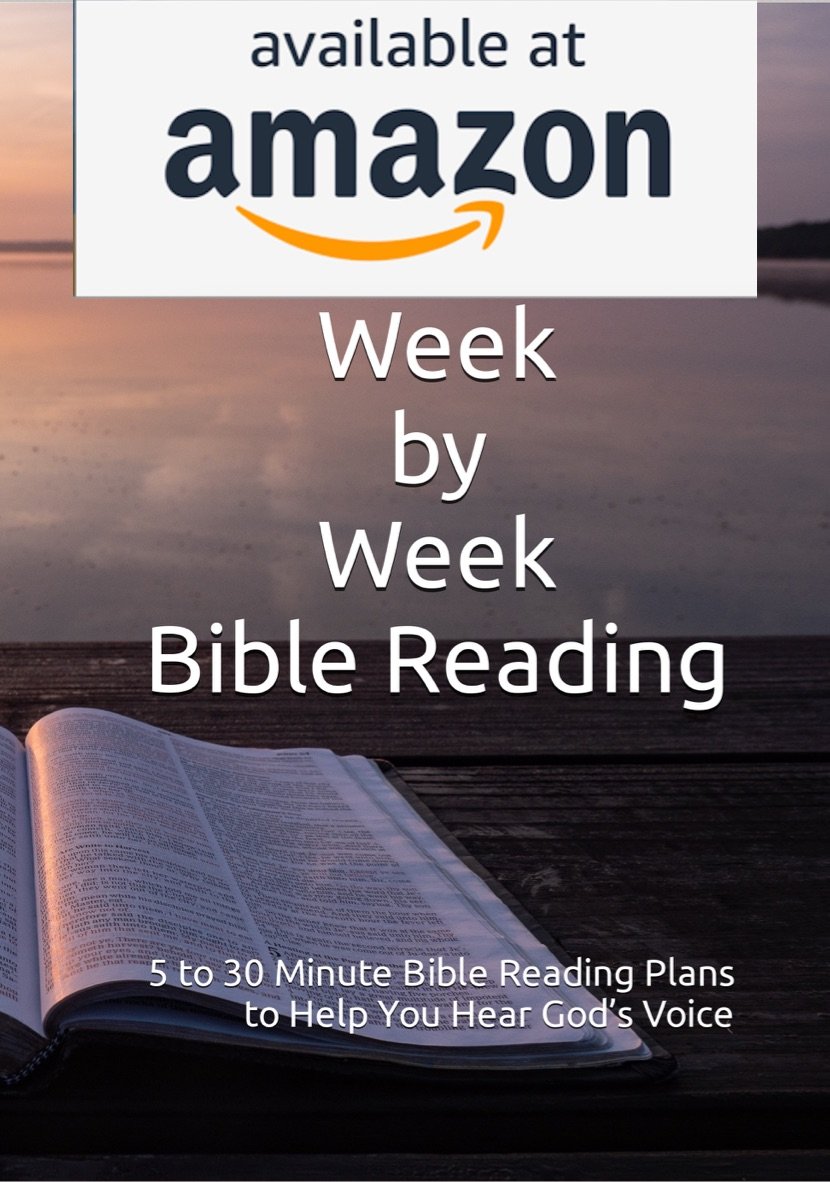2024 Sunday School Discussion Guide
Together we will read through the Old Testament in 2024!
Here are some helpful discussion questions for your Sunday School class or small group!
April Bible Reading Discussion Questions
April 7 - Week 13 – The Old Testament
Numbers 22-36
Family Life - Small Group Warm Up Question:
If you had to choose one of your five senses (taste, touch, smell, sight, hearing) to lose, which one would you choose? Which sense would you never want to lose?
Use these questions for personal prayer, reflection, study, journaling, or small group discussion.
1. Numbers lists some of the many failures of the Israelite in the desert wanderings. What stands out to you in their rebellions and why? What lessons can we learn from these sins of Israel?
a. Numbers 11:1-3 – Complaining about hardships – burned by fire
b. Numbers 11:4-34 - Craving for meat & complaining about manna, Moses doubts God’s power to provide meat, Joshua’s jealousy over 2 prophesying within the camp – 70 elders consecrated, severe plague kills those with the “craving”
c. Numbers 12 – Miriam and Aaron opposed Moses – Miriam made leprous
d. Numbers 13:26-14:38 – in Kadesh-Barnea 10 out of the 12 spies speak against going into the Promised Land due to fear of the people of the land, Joshua and Caleb speak in favor of advancing, the Israelites wish to be back in Egypt, the Israelites talk about stoning/executing Moses, Aaron, Joshua, & Caleb – Israel banished to wander in the desert for 40 years, 1 for each day that the spies were in the Promised Land, the 10 unfaithful spies were killed by a plague
e. Numbers 14:39-44 – a group decides to attack and presumptuously go into the Promised Land instead of wandering in the desert – the Lord does not go with this group & they are defeated by the Amalekites and Canaanites to Arad/Hormah
f. Numbers 16:1-40 – Korah and his followers rise up against Moses, coveting more attention to be priests – the ground opens up & swallows the families of the rebellious, 250 leaders are consumed by fire, the 250 censers become a bronze covering for the altar as a remembrance & warning that only the descendants of Aaron can offer incense
g. Numbers 16:41-50 – the Israelites complain against Moses and Aaron about the deaths of Korah and his followers – a plague spreads and kills 14,700 people
h. Numbers 17 – constant complaining against Aaron’s priestly leadership – God makes Aaron’s staff bud & produce almonds overnight, kept in the Ark as a reminder
i. Numbers 20:1-13 – at Meribah the people quarrel with God, wishing they were dead due to the desert and absence of water, Moses and Aaron pridefully strike a rock for water instead of speaking to it as instructed – Moses & Aaron will not enter the Promised Land since they did not trust in God enough and honor Him as holy
j. Numbers 20:1-21; 21:1-3 – Israelites do not seek the Lord when they encounter the Edomites – Israel takes the long route around Edom into the Promised Land, some Israelites are captured by the Canaanites in Arad/Hormah before they seek the Lord in a vow and defeat the Canaanites
k. Numbers 21:4-8 – the Israelites grow impatient, speaking against God and Moses and complaining about their food and water, calling manna “worthless” – the Lord sends venomous snakes that bite and kill many, only the Lord has power over the snake and provides His solution to their sin, they have the responsibility to trust God’s commands, move in obedience while wounded by their sin, look up to the image of salvation, believe unto God for their healing; God’s perfect justice bring wrath and life
l. Numbers 22:32, 25:1-9, 31:16 (2 Peter 2:15, Jude 1:11) – the Moabites and Midianites pay the greedy Balaam to use his false, pagan practices to attempt to curse Israel (he can’t curse what God has blessed – Genesis 12:2-3), but then resorts to sexual seduction of the Israelites and their false worship of their local gods – a plague kills 24,000 before the priest Phineas spears an Israelite man and a Midianite woman simultaneously, in Numbers 31 God executes justice on the Midianties for their sexual immorality
2. The bronze serpent is later referred to as the “Nehushtan” (2 Kings 18:4) and is later turned into an idol by Israel to which they made sacrifices until King Hezekiah righteously destroys it by breaking it into pieces. Why do Protestants (non-Catholic/Orthodox Christians) resist the use of images, statues, amulets, charms, scapulars, beads, and relics? How can you tell if you have an object that has become an idol in your life? What are some examples?
3. In the tribe of Manasseh a man named Zelophehad had no sons, only daughters (Numbers 26:33, 27:1-11, 36:1-12) and specific protections were made for the daughters to receive their father’s inheritance. Why do you think God gives such counter-cultural attention, protections, and provisions to women?
a. See also: “Women of Faith in the Bible” www.trustworthyword.com/women
4. The 20+ year old male population of Israel was still over 600,000 after 38 years in the desert (from 603,550 to 601,730). Assuming one woman for every man, over 1.2 million Israelites died as a consequence of their rebellion, which equals around 86 funerals a day or 31,500 deaths a year. What do you think it would have been like for this new generation to see so much death? How do funerals affect you?
5. Do you think the new generation of Israelites learned from their forefathers’ failures? Have you seen this problem in your families? Where the sinful influence of one generation normalizes rebellion against God? When a family wanders from God, what can be done to help?
6. Leviticus shows God’s faithfulness in the midst of Israel’s rebelliousness. How have you seen God be faithful in the midst of your rebelliousness? Why is it important not to presume on God’s kindness and patience? (see Romans 2:3-5)
7. The story of Balaam and his donkey is unusual but important (Numbers 22-24). What lessons stood out to you from this story?
8. Numbers 28-29 reiterates the importance of offerings and Jewish feasts. Why do you think this focus was renewed before their entry into the Promised Land? Why should churches regularly focus on Christian giving and holy-days (Christmas, Easter, the Lord’s Day/Sundays)?
9. God instructs the Israelites to totally destroy the tribes (Arad/Sihon King of the Amorites/Og King of Bashan – Numbers 21, Moab – Numbers 31) with a very specific statement in Numbers 33:51-56 to drive them all out and destroy their idols and false worship. With this statement comes the warning that if they do not, the inhabitants will “thorns in your sides” and “give you trouble where you live.” What do we see in Israel today and how is it connected to this passage? Why does God take pagan sin and false worship so seriously? Do we take sin as serious as we should?
10. Moses says “you may be sure that your sin will find you out” (Numbers 32:23) as a warning. Read Luke 12:2-3. How have you seen this truth play out? Why is it important to remember?
April 14 - Week 14 – The Old Testament
Deuteronomy 1-15
Family Life - Small Group Warm Up Question:
Which abilities do you fear losing as you age (memory, walking, etc.)?
Use these questions for personal prayer, reflection, study, journaling, or small group discussion.
1. Deuteronomy starts out saying that “Moses spoke to the people of Israel according to all that the LORD had given him in commandment to them” (Deuteronomy 1:3). What temptations do you think Moses faced in speaking to the Israelites? What temptations do you face when speaking to others about the Bible (God’s commandments)? What parts of the Bible are easy to share? What parts of the Bible are harder to share? What are evidences of a good pastor preaching the “whole counsel of God” (Acts 20:27)?
2. Deuteronomy is how God communicates his final words to Israel. He repeats some of the history and commands of God as well as sharing new commands. If you had a short time left on earth to write down, video record, or speak out your final words, what would you say? Why?
3. Deuteronomy 1-3 highlights some of the giants in the Promised land, namely the Rephaim, the Nephalim/Anakim, the Zuzim, the Emim, and the Amorites. Previously in Genesis 6:1-4, it seems that while demons (fallen angels, “sons of God”) did unite sexually with women, perhaps giving birth to the Nephilim giants (pre-flood). These stories of giants can seem quite intimidating for those going into battle. Why do you think the Lord repeats this history of defeated giants to Israel through Moses? Read Deuteronomy 3:21-22. What enemies does Jesus defeat on the cross? What enemies have you seen Jesus’ victory in your life?
4. While God forgives our sins through Jesus, often we suffer the consequences of our sins. Deuteronomy 3:23-29 recounts that Moses again asks God to allow him to enter the Promised Land. God’s response is described as “angry” and He says “Enough from you; do not speak to me of this matter again.” Can you think of a time in your life when you may have made God angry with your behavior or requests?
5. Deuteronomy 4:2 says “You shall not add to the word that I command you, nor take from it, that you may keep the commandments of the LORD your God that I command you.” Can you name an example of where you see people “adding” to the commandments of the Lord today? How is having our own opinions about God and Christianity a serious form of “adding” to God’s Word? What are ways in which we might be tempted to “take” away commandments of the Lord? How do you see that playing out today?
6. What does it look like to “keep your soul diligently” (Deuteronomy 4:9)? Why is it important?
7. What are some of the best ways you have found to make God’s truths known “known to your children and your children’s children”? (Deuteronomy 4:9) Read Deuteronomy 6:7-9. How does this help us to think about keeping God’s Word a priority in our lives and for the sake of the next generation? What challenges do you see ahead for your kids and grandkids?
8. Sin is described as “putting the Lord your God to the test” (Deuteronomy 6:16) when they argued with Moses about water at Massah/Meribah (Exodus 17:7) and said “Is the Lord among us or not?” When was a season when you complained about or doubted God’s provision or presence with you? Why is that such a serious sin? As a parent, how have you experienced something similar with your kids sinning against you?
9. Look at God’s warning in Deuteronomy 7:1-5. What do you know of Israel’s obedience to this command? Why did God give them such a strict command with such consequences?
10. Read Deuteronomy 10:12-13. How is this such a great summary of our purpose in life?
April 21 - Week 15 – The Old Testament
Deuteronomy 16-30
Family Life - Small Group Warm Up Question:
If you were the leader of your country and could make one permanent change, what would you do?
Use these questions for personal prayer, reflection, study, journaling, or small group discussion.
1. Deuteronomy literally means, “the second law”, as Moses repeats the previous laws already told to the first generation (plus adds a few more). Parents often want their kids to learn from their mistakes, and this plays out in Deuteronomy. What lessons would you want your kids to learn so that they do not repeat the mistakes you made while growing up?
2. Deuteronomy 16-18 highlights some of the leadership structures for Israel in elders, priests, judges, and kings. Why do you think a structure of leadership is important within a nation? A company? A church? A family? What are the challenges of leadership? What do you think makes for godly leadership in any of these settings?
3. In Deuteronomy 18:15-22 we hear of God’s promise to send a prophet like Moses and we see that fulfilled in Jesus (Acts 3:22–24; Acts 7:37). Why do you think God makes so many prophecies about Jesus across the Old Testament? How does that encourage your faith? This ending of Deuteronomy 18 also warns of false prophets and says they can be identified by their false predictions. Why does God give so many warnings of false prophets? How have you seen false prophets in the world today? What are some other ways to recognize them?
a. See also: www.trustworthyword.com/what-does-the-bible-say-about-false-teachers
4. While some of these laws make not make sense to us today (but compared to the contemporary culture of that day, they are amazing!), there are ways that their wisdom can have modern-day application. Consider how Paul uses Deuteronomy 25:4 in 1 Corinthians 9:9 (“You shall not muzzle an ox when it treads out the grain”) to explain that spiritual leaders may sometimes need physical/financial support for their spiritual work. Can you think of other modern-day applications (marriage, family, financial, business, governmental, etc.) from the principles behind any laws you have seen in Deuteronomy 19-26?
5. Deuteronomy 20 focuses on laws of warfare. What do you know about laws of warfare today? Why are they important? How could they best be enforced?
6. Deuteronomy 22 talks about sexual immorality and Deuteronomy 24 speaks of divorce. Which of God’s commands and principles about sexual immorality, marriage, and divorce so you wish you had heard earlier in life? Obeyed earlier in life? What practical biblical advice would you give a young man or woman today?
a. See also: www.trustworthyword.com/what-does-the-bible-say-about-sexual-sin
b. See also: www.trustworthyword.com/what-does-the-bible-say-about-homosexuality
c. See also: www.trustworthyword.com/what-does-the-bible-say-about-divorce-and-remarriage
7. Deuteronomy 26 speaks of tithes and giving to God? What are some of your favorite veres and biblical principles about money? (www.trustworthyword.com/what-does-the-bible-say-about-money )
8. Parents often use the word “listen” a lot. Why? Read Deuteronomy 30:15-20. How would you summarize Moses’ statement here? How would you speak this into the lives of your kids and grandkids?
9. Read Deuteronomy 29:29. What does this mean? How does it impact you?
10. Read Deuteronomy 31:7-8 as Moses speaks to Joshua. Why is this such an important and encouraging statement? What does Joshua have ahead of him?
April 28 - Week 16 – The Old Testament
Deuteronomy 31-34 ~ Joshua 1-11
Family Life - Small Group Warm Up Question:
If your house was on fire, what five things would you prioritize to get out of the house?
Use these questions for personal prayer, reflection, study, journaling, or small group discussion.
1. Read Joshua 1:5-9. Although Moses has already said something similar to Joshua (Deuteronomy 31:7-8) this is directly from the Lord. What is the difference in reading something from a devotional or hearing it from a sermon versus hearing/seeing it directly yourself in the Word of God? Why is Bible reading so important? How is your year of Bible reading going so far? How do you want to improve and finish the year ahead?
2. Why Canaanites – sexual immorality, child sacrifice – like a genocide? Hyperbole “totally destroy”, “no survivors” – drive them out, do not intermarry, no business; God was open to those who turned to God – limited battles and region, Deut 20 – pursue peace otherwise – descriptive, not prescriptive – God’s wrath on evil and protection of His people
3. What do you think about the fact that a prostitute becomes the hero God uses to protect the lives of the Israelite spies in Joshua 2? What do you think the significance is that Rahab is part of the lineage of Jesus (Matthew 1:5)? How does that encourage you in regard to your own past? Hebrews 11:31 says, while listing the “heroes of the faith”, “By faith Rahab the prostitute did not perish with those who were disobedient, because she had given a friendly welcome to the spies.” James 2:23, in explaining the evidential works of saving faith, says that “Rahab the prostitute justified by works.”
4. In Joshua 3, we see Israel cross the Jordan. In this miracle, the flood-stage river is backed up 20 miles in distance, with a wall of water 100’ tall and 2 miles long. Why do you think God has such a miraculous crossing both out of Egyptian slavery and into the Promised Land? (Joshua 3:10) Later in the Bible we see Elijah and Elisha miraculously cross the Jordan River (2 Kings 2) and Jesus is baptized (Matthew 3) in the same location as the crossing. What connections do you see between these events? Why do you think God uses baptism as an outward symbol of our inward repentance and faith?
5. In Joshua 4, God commands the Israelites to set up a memorial of 12 stones from the middle of the river crossing to memorialize what the Lord did for the sake of future generations. What are ways we can communicate, memorialize, and pass on the work of the Lord in our lives?
6. In a seemingly unusual timing, God commands the Israelite men to be circumcised while close to the powerful city of Jericho (Joshua 5:1-9). In Romans 2:29 Paul explains that faith is not an outward, physical, legalistic action (like circumcision) but rather an inward, spiritual “circumcision” of the heart. When and how did God “cut” your heart as you left your spiritual slavery and wandering? How did it hurt you? How did it heal you? How was your faith evidenced afterwards as you entered into the security of eternal life? Do you think God’s timing with the Passover connection is a coincidence?
7. In Joshua 5:13-15, Joshua meets an angel, the “commander of the army of the Lord.” Why is the most important question of life whether or not we are on God’s side of the spiritual battle?
8. What stands out to you about God from the battle of Jericho in Joshua 6?
9. What stands out to you about Israel from the battle of Ai in Joshua 7? How might we be tempted to the “sin of Achan”? What can we learn to resist similar temptations?
10. While the Gibeonites are deceptive in their approach to the Israelites (Joshua 9), they are the only Canaanites to seek peace with the God of Israel compared to the other Canaanite kings (Joshua 10-12). What external, surrounding pressures do non-believers face today in coming to Christ by approaching a faithful Christian, a biblical church, or a reading/study of the Bible?
11. What can we learn, and how can we process the miraculous stopping of the sun in Joshua 10? Why do people try to explain away the miracles of the Bible with naturalistic reasoning?
May 5 - Week 17 – The Old Testament
Joshua 12-24 ~ Judges 1-2
Family Life - Small Group Warm Up Question:
Would you rather be more famous, wealthier, more athletic, or more intelligent?
Use these questions for personal prayer, reflection, study, journaling, or small group discussion.
Watch the Bible Project’s 9 minute video on Joshua if you have the time: https://www.youtube.com/watch?v=JqOqJlFF_eU While some may seek to characterize the Israelite takeover of the Promised Land as “genocide”, the reality is that all of the inhabitants (minus the Hivites/Gibeon) refused to make peace with Israel (Joshua 11:19–20). God was punishing the inhabitants of Canaan for their sexual immorality, murder of children, and false worship. While this calling of God for war was for a particular time and people, it demonstrates God’s holiness and justice. What sorts of evil stand out to you in your country and society today? How can we reach people in those sins so that they find peace with God thru Jesus?
Have you or any of your family experienced war? What was that like? How does a time of war give you greater appreciation for when you have “rest from war” (Joshua 11:23)? How can we best pray for people in warzones today? For military deployed into conflict? For times of peace?
While there are impressive victories listed in Joshua 12 & 13, it also quickly becomes evident that Israel did not fully drive out the pagan inhabitants as God had instructed them. Why do you think they only partially obeyed God? How do you think they justified their disobedience? What are some ways we might be tempted to partially obey God’s commands? What ways do we try to justify our disobedience?
While the listing of boundaries in Joshua 13-21 may seem boring to us today, it evidences the accuracy of the Scriptures as many of these seemingly insignificant towns and cities have been archaeologically discovered. Why do you think God gives us so much evidence for the accuracy of the Bible?
Read over Genesis 15:13-16, 18-21. How does it grow your faith to see how God both specifically foretold and upheld His promises to Abraham over 600 years later?
Caleb, who along with Joshua had been faithful “spies” earlier in the exodus journey, courageously requests the hill country of Hebron (Joshua 14:12) despite its occupation from the Anakim giant people. How does Caleb’s confidence in the Lord’s power and presence inspire and encourage your faith with your future battles?
In Joshua 20, cities of refuge are established for those who accidentally kill someone else, to give them protection from “the avenger of blood” while he awaits judgment. What does this teach us about God’s care and protection through governmental rules?
The Lord provides cities and pasture lands for the priests (Levites) in Joshua 21, with them spread out and living among the tribes of Israel. Why do you think the Lord spread them out this way instead of them all staying just around the Tabernacle?
Read Joshua 21:43–45. What does this teach us about the character of God?
When the tribes east of the Jordan build an altar of their own (Joshua 22:10-34), the other tribes prepare for war against them. Once they clarify that the altar is a “Witness” for the next generation and not for sacrifice, peace is made. What does this dispute tell us about how Israel regarded the holiness of God at this time?
In chapters 23 & 24, Joshua gives his final speech to Israel before he dies. He reminds them of God’s work and warns them of God’s judgment. Joshua says “as for me and my house, we will serve the Lord” (Joshua 24:15) and the people agree in covenant with him. What is the purpose of a covenant? How can a covenant be helpful for a local church? What is important in a covenant?





